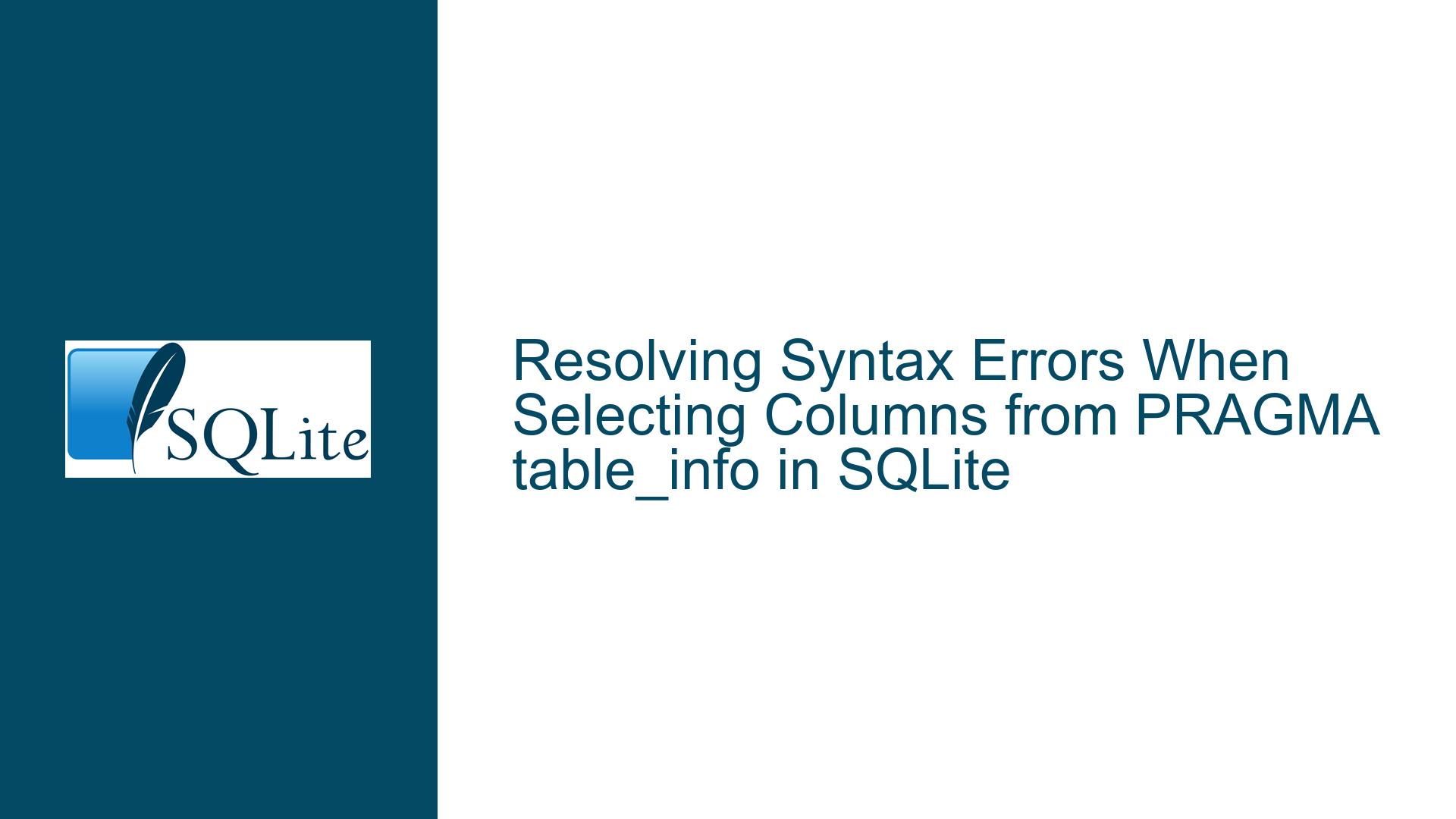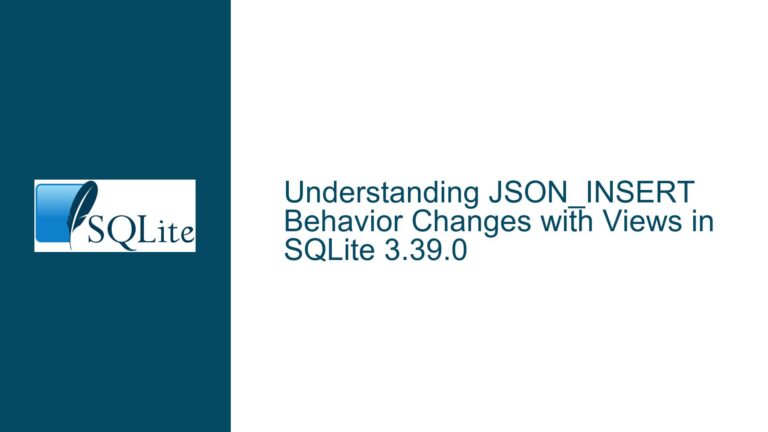Resolving Syntax Errors When Selecting Columns from PRAGMA table_info in SQLite
Understanding the Syntax Conflict Between PRAGMA Directives and Table-Valued Functions
The core issue revolves around a syntax error encountered when attempting to query a specific column from the output of PRAGMA table_info(mytab) in SQLite. The user initially executes the PRAGMA table_info(mytab) command directly, which returns a result set containing metadata about the columns of the table mytab. However, when attempting to select a single column (e.g., name) from this result set using a SELECT statement, a syntax error occurs: Error: near "(": syntax error.
This problem arises due to a misunderstanding of how SQLite’s PRAGMA directives interact with standard SQL syntax. Specifically, the PRAGMA command is not directly compatible with SELECT statements in traditional usage. Instead, SQLite provides a newer mechanism—pragma functions—that allow PRAGMA-like operations to be invoked as table-valued functions within SQL queries. The confusion stems from the syntactic differences between the legacy PRAGMA command and the modern pragma_table_info() function.
To resolve this, one must recognize that PRAGMA table_info operates as a standalone command-line directive in SQLite, whereas pragma_table_info() is designed to function as a virtual table that can be queried using standard SQL syntax. This distinction is critical for writing valid queries that extract specific columns from the table metadata.
Key Factors Leading to Invalid Syntax and Misinterpreted Functionality
1. Incorrect Use of PRAGMA as a Table or Subquery
The PRAGMA directive in SQLite is primarily a utility command for querying or modifying database internals. Historically, it has not been designed to act as a table or subquery in a SELECT statement. When the user attempts to write SELECT name FROM PRAGMA table_info(mytab), SQLite’s parser interprets PRAGMA as part of the FROM clause but cannot resolve it as a valid table, virtual table, or subquery. This results in a syntax error because the PRAGMA command does not follow the expected grammar rules for SELECT statements.
2. Confusion Between PRAGMA Command and Pragma Functions
SQLite 3.16.0 (2017-01-02) introduced pragma functions, which are table-valued functions that emulate PRAGMA operations but integrate seamlessly with SQL syntax. The function pragma_table_info('table_name') is the correct replacement for PRAGMA table_info(table_name) in SQL queries. However, users accustomed to the older PRAGMA syntax might overlook this distinction, leading to attempts to use PRAGMA directly in SELECT statements.
3. Argument Format: String Literal vs. Identifier
The pragma_table_info() function requires the table name to be provided as a string literal (enclosed in quotes). For example, pragma_table_info('mytab') is valid, whereas pragma_table_info(mytab) (without quotes) would treat mytab as an identifier, potentially leading to errors if no such identifier exists in the current scope. This is a common pitfall when transitioning from the PRAGMA command, where the table name is specified as an identifier.
4. Column Name Case Sensitivity and Aliasing
The column names returned by pragma_table_info() (e.g., cid, name, type) are case-sensitive in SQL queries. If a user attempts to reference a column with incorrect casing (e.g., NAME instead of name), the query will fail unless the column is explicitly aliased. Additionally, some SQLite configurations enforce case sensitivity for column names, further complicating the issue.
Step-by-Step Solutions for Querying Column Metadata Correctly
1. Using the Pragma Function Syntax
Replace the PRAGMA command with the pragma_table_info() function in SELECT statements. This function returns a virtual table with the same structure as PRAGMA table_info, allowing standard SQL operations:
SELECT name FROM pragma_table_info('mytab');
Ensure the table name is enclosed in single quotes. For tables with spaces or special characters, use double quotes:
SELECT name FROM pragma_table_info('"my table"');
2. Validating SQLite Version Compatibility
Pragma functions were introduced in SQLite 3.16.0. To verify compatibility, check the SQLite version:
SELECT sqlite_version();
If the version is older than 3.16.0, upgrade SQLite or use the legacy PRAGMA command in a separate step.
3. Combining Pragma Functions with Joins or Filters
Pragma functions can be integrated into complex queries. For example, to retrieve column names and types for a table:
SELECT name, type
FROM pragma_table_info('mytab')
WHERE pk = 0; -- Exclude primary key columns
To join metadata from multiple tables:
SELECT t1.name AS col1, t2.name AS col2
FROM pragma_table_info('table1') AS t1
JOIN pragma_table_info('table2') AS t2 ON t1.cid = t2.cid;
4. Handling Case Sensitivity and Column Aliases
If column names are referenced with incorrect casing, alias the results explicitly:
SELECT name AS "ColumnName" FROM pragma_table_info('mytab');
5. Programmatic Use in Applications
When using SQLite in an application (e.g., Python, Java), execute pragma_table_info() as a parameterized query to avoid SQL injection:
import sqlite3
conn = sqlite3.connect('mydb.db')
cursor = conn.cursor()
cursor.execute("SELECT name FROM pragma_table_info(?)", ('mytab',))
columns = [row[0] for row in cursor.fetchall()]
6. Debugging Common Errors
- Syntax Error Near "(": Indicates incorrect use of
PRAGMAinstead ofpragma_table_info(). - No Such Column: Verify column names match the output of
pragma_table_info()(useSELECT *first). - No Such Table: Ensure the table name is spelled correctly and enclosed in quotes.
7. Alternatives for Older SQLite Versions
For environments where upgrading is not feasible, use a temporary table to store PRAGMA results:
CREATE TEMP TABLE temp_table_info AS
SELECT * FROM pragma_table_info('mytab');
SELECT name FROM temp_table_info;
Or use the legacy PRAGMA command in a separate query.
By addressing the syntactic differences between PRAGMA commands and pragma functions, ensuring proper argument formatting, and leveraging SQLite’s table-valued functions, users can effectively query column metadata without encountering syntax errors. This approach maintains compatibility with modern SQL practices and enables seamless integration into complex database operations.






